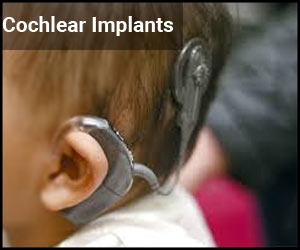- Home
- Editorial
- News
- Practice Guidelines
- Anesthesiology Guidelines
- Cancer Guidelines
- Cardiac Sciences Guidelines
- Critical Care Guidelines
- Dentistry Guidelines
- Dermatology Guidelines
- Diabetes and Endo Guidelines
- Diagnostics Guidelines
- ENT Guidelines
- Featured Practice Guidelines
- Gastroenterology Guidelines
- Geriatrics Guidelines
- Medicine Guidelines
- Nephrology Guidelines
- Neurosciences Guidelines
- Obs and Gynae Guidelines
- Ophthalmology Guidelines
- Orthopaedics Guidelines
- Paediatrics Guidelines
- Psychiatry Guidelines
- Pulmonology Guidelines
- Radiology Guidelines
- Surgery Guidelines
- Urology Guidelines
Cochlear Implantation before 12 months may empower kids to speak, understand language

Deaf Kids with Cochlear Implants before 12 months may learn to speak, understand the language, finds research.
Researchers from Ann & Robert H. Lurie Children’s Hospital of Chicago have presented evidence that deaf children who received cochlear implants before 12 months of age learn to more rapidly understand spoken language and are more likely to develop spoken language as their exclusive form of communication.
In their study, published in Otology and Neurotology, this was true even for children with additional conditions often associated with language delay, such as significantly premature birth. Researchers also showed that implantation surgery and anaesthesia were safe in young children, including infants.
“Our results clearly show that kids who received cochlear implants in infancy make progress more rapidly and are more likely to use spoken language as their sole means of communication,” says lead author Stephen Hoff, MD, from Lurie Children’s, who is also Associate Professor at Northwestern University Feinberg School of Medicine. “More than 90% of deaf children have hearing parents. Most parents hope that a cochlear implant will enable their child to talk. However, early implantation is not a public policy priority. For this reason, many children are not evaluated for cochlear implantation until they are over age 12 months.”
Currently, every state has a newborn hearing screening requirement, which has resulted in earlier diagnosis of hearing loss and fitting of hearing aids. However, no public policy promotes early identification of deaf infants whose hearing would be much improved with cochlear implantation in comparison to hearing aids.
“Cochlear implants are remarkable in that they enable children to hear the high pitch consonants such as “s”. These are the sounds that hearing aids cannot make audible to deaf children. The sooner children are able to hear through an implant, the more likely they will understand when others talk, and learn to speak clearly,” says senior author Nancy Young, MD, Medical Director of Audiology and Cochlear Implant Programs at Lurie Children’s and Professor at Northwestern University Feinberg School of Medicine. “Infants should be evaluated to determine if cochlear implantation would provide superior hearing. The procedure is safe and the results can be transformative.”
In the study, researchers reviewed Lurie Children’s experience with 219 children who underwent cochlear implantation before they were three years old, including a group of 39 children who were implanted when younger than 12 months of age. The mean age at last follow-up was 7.5 years. They found that implanted infants developed word understanding ability one year earlier than those implanted as toddlers and were more likely to use spoken language alone to communicate. Children who were implanted after 2 years of age were much less likely to use spoken language exclusively.
Drs. Young and Hoff are preparing to lead a multicenter clinical trial on the safety and efficacy of implantation of infants and children receiving a MED-El cochlear implant system. The study, expected to open later in 2019, has the potential to expand Food and Drug Administration (FDA) labelling for cochlear implantation to children as young as age 7 months of age. At present, all cochlear implant systems have approval for use in children 12 months of age and older, based upon FDA clinical trials done several decades ago. However, many implant programs use these devices off label based on more recent studies indicating superior outcome.
Research at Ann & Robert H. Lurie Children’s Hospital of Chicago is conducted through the Stanley Manne Children’s Research Institute. The Manne Research Institute is focused on improving child health, transforming pediatric medicine and ensuring healthier futures through the relentless pursuit of knowledge. Lurie Children’s is ranked as one of the nation’s top children’s hospitals in the U.S.News & World Report. It is the pediatric training ground for Northwestern University Feinberg School of Medicine. Last year, the hospital served more than 212,000 children from 49 states and 51 countries.

Disclaimer: This site is primarily intended for healthcare professionals. Any content/information on this website does not replace the advice of medical and/or health professionals and should not be construed as medical/diagnostic advice/endorsement or prescription. Use of this site is subject to our terms of use, privacy policy, advertisement policy. © 2020 Minerva Medical Treatment Pvt Ltd